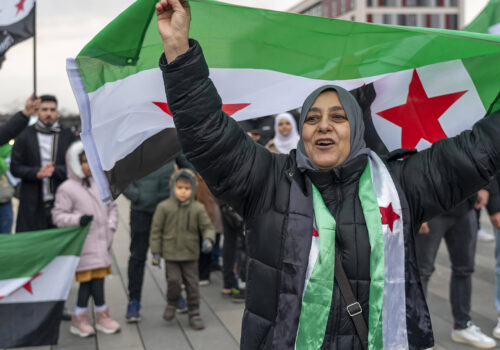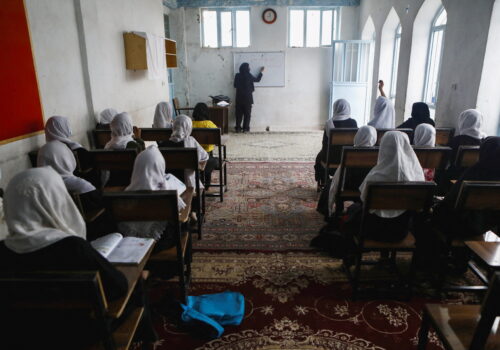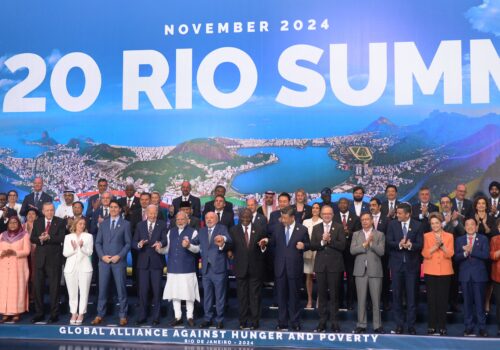Twenty-five years on, advancing the Women, Peace, and Security agenda is more urgent than ever
Twenty-five years ago today, the United Nations (UN) Security Council, under the chairmanship of Namibia, unanimously adopted Resolution 1325 on Women, Peace, and Security—a landmark recognition of women’s vital role in peacebuilding, conflict prevention, and post-conflict recovery. Spearheaded by Namibia’s then minister of women’s affairs, Netumbo Nandi-Ndaitwah, and advanced through the persistent advocacy of women’s rights and civil society groups, the resolution transformed decades of activism into binding international policy. Supported by leaders such as Anwarul Chowdhury, the then ambassador of Bangladesh to the UN, Resolution 1325 marked the first time the Security Council affirmed that women’s equal participation is essential to sustainable peace. Yet, a quarter century later, the stakes could not be higher. According to the Georgetown Institute for Women, Peace, and Security Index, cited in the UN secretary-general’s latest report on women, peace, and security (WPS), a staggering 676 million women and girls now live within fifty kilometers of active conflict zones—the highest number recorded in recent history.
Resolution 1325 was designed to increase women’s participation across UN peace and security efforts, urge parties to conflict to take special measures to protect women and girls from gender-based violence, and establish operational mandates with direct implications for member states and UN entities. Since its adoption, nine follow-on resolutions have built on 1325, providing substantive guidance to member states on implementing the agenda and addressing challenges to peace and security. However, implementation by member states remains weak, leaving civil society and women’s movements as the primary drivers of progress on the ground.
Smaller nations now carry the mantle of moral leadership, just as Namibia did in 2000 when it led the UN Security Council to adopt the resolution.
Women are not waiting for peace to be delivered from above; they are building it from the ground up, often in the most dangerous and fragile contexts. In Afghanistan, for example, where basic human rights have been stripped from women and girls, organizations such as DROPS are sustaining underground networks and using innovative digital tools to hear and respond to women’s needs despite constant surveillance. Even in exile, Afghan women leaders’ advocacy to codify gender apartheid as a crime under international law could open new pathways for accountability against the Taliban and deter governments from normalizing relations with the regime. Even in times of unprecedented repression, women continue to define the parameters of justice and equality.
In Myanmar, where a brutal military junta continues to massacre civilians and suppress dissent, women now represent nearly 60 percent of pro-democracy and human rights defenders. They have built decentralized resistance networks that embody the WPS agenda in real time—organizing humanitarian corridors, documenting abuses, shaping local governance in liberated areas, and convening regularly across ethnic and religious lines to coordinate strategies for protection, response, and political reform. Their work illustrates that inclusion and security are not post-conflict luxuries—they are the foundation for democratic resilience.
In Ukraine, where the war grinds on, the WPS agenda has taken on a forward-looking form, focused not only on survival but on recovery and justice. Through the leadership of the government commissioner for gender equality and survivor networks such as SEMA Ukraine, the country has become the first in history to establish urgent interim reparations for survivors of conflict-related sexual violence during an ongoing war. Ukraine’s advocacy is having an effect: In August, the UN secretary-general warned Russia that it risked being listed as a state using sexual violence as a tactic of war, a designation that could lead to barring Russia from participating in UN peacekeeping missions. Ukrainian women leaders have also spearheaded the Alliance for a Gender-Responsive and Inclusive Recovery for Ukraine—a $48 million initiative uniting governments, civil society, and the private sector to embed gender equality in reconstruction.
The same spirit of persistence defines Colombia’s experience. The 2016 peace accord with the Revolutionary Armed Forces of Colombia, or FARC, remains a global model for gender inclusion. This is thanks to the tireless advocacy of women’s civil society groups and the work of a dedicated Gender Sub-Commission, which ensured that commitments to equality and protection against sexual violence were embedded throughout. But as international funding declines and the implementation process falters, women leaders warn of backsliding. In Quibdó, Afro-Colombian mothers have emerged as the quiet architects of peace—organizing neighborhood dialogues to protect children from recruitment, running “ARTivism” programs that use creativity to resist violence, and demanding justice for those killed in ongoing clashes. Their daily acts of courage remind us that peace is not just negotiated in conference rooms; it is built each day in kitchens, classrooms, and community centers.
In Yemen, where water scarcity has fueled years of conflict and community division, women have stepped in to mediate what politics could not. Women leaders at Food4Humanity and the Women’s Alliance for Security Leadership helped broker a local water-sharing agreement between warring tribes—an act that prevented further fighting and restored access to safe water for thousands of families. Their work demonstrates how women’s leadership in conflict prevention extends beyond formal negotiations to the everyday essentials of human security—water, food, and dignity.
These examples matter deeply because they reveal shared patterns of abuse and resistance across continents. First, sexual violence is increasingly used as a deliberate tactic of war—a means to terrorize, displace, and destroy the social fabric of communities by attacking culture and identity itself. Second, there is a growing disregard for the rules of war, with the systematic targeting of civilians and destruction of critical infrastructure—from hospitals in Gaza to kindergartens in Ukraine—undermining the very notion of humanitarian restraint. Third, the lack of international accountability mechanisms continues to embolden perpetrators; too often, justice remains out of reach. Most concerning is the interconnected web of enablers, including UN member states that provide weapons, funding, and political cover that link actors across regions.
In recent months, the WPS agenda has faced a major backlash. The US Women, Peace, and Security Act of 2017, the first national legislation mandating the integration of WPS into foreign policy anywhere in the world, has been sidelined within the State Department and the Department of Defense, with annual reporting to Congress faltering. Simultaneously, cuts at the US Agency for International Development and in global funding have undermined women’s organizations’ capacity to sustain essential work. According to a global peace-builder survey by the Georgetown Institute for Women, Peace, and Security published this month, 40 percent of respondents reported decreased funding over the past two years, while 43 percent identified long-term funding as critical to achieving their peace and security goals.
In the absence of a strong and united UN Security Council, where veto powers often block meaningful action, it is vital to defend Resolution 1325 and deliver on its promise. Smaller nations now carry the mantle of moral leadership, just as Namibia did in 2000 when it led the UN Security Council to adopt the resolution. Countries such as Denmark, Panama, Greece, Slovenia, and other nonpermanent members of the UN Security Council have shown openness to leading on the agenda, offering hope that breakthroughs remain possible. As the world marks the twenty-fifth anniversary of Resolution 1325, these examples remind us that while power may shift and institutions may falter, women’s leadership continues to light the path toward peace, accountability, and shared security.
Melanne Verveer is the executive director of the Georgetown Institute for Women, Peace, and Security, a former US ambassador-at-large for global women’s issues, and a member of the Atlantic Council board of directors.
Ana Lejava is a senior policy officer with the Georgetown Institute for Women, Peace, and Security.
Further reading
Mon, Mar 10, 2025
Syria’s women face a new chapter. Here’s how to amplify their voices.
MENASource By Diana Rayes , Hind Kabawat
It is critical for women to be involved in transitional justice and constitutional reform processes in Syria.
Wed, Jul 2, 2025
How centering Afghan women and youth now can help challenge oppressive regimes in the future
Inside the Taliban's gender apartheid By
Empowered Afghan youth and women embody a future vision for the country rooted in rights, participation, and accountability.
Fri, Mar 7, 2025
Charting the path for women’s economic security in the G20
Econographics By Alisha Chhangani, Jessie Yin
For International Women's Day this year, here are five charts about gender gaps in the G20. Closing these gaps would boost economic benefits for everyone.
Image: October 27, 2025: Annalena Baerbock, president of the General Assembly, speaks at the 25th Anniversary of Security Council Resolution on Women, Peace and Security. Beside her in blue is the UN Deputy Secretary General Amina Mohammed. (Credit Image: © Bianca Otero/ZUMA Press Wire via REUTERS Connect)



